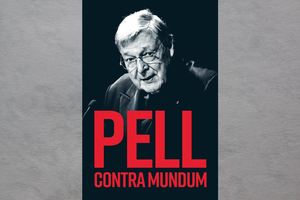Cardinal Pell: ‘Resistance’ in the Secretariat of State Cost Vatican Money in London Deal
According to Vatican investigators, a two-year-long probe into the controversial London investment revealed numerous bad actors, some of whom are accused of actively working to defraud the Secretariat of State.

VATICAN CITY — Cardinal George Pell, the Vatican’s former economy czar, said if his office had been able to intervene sooner, it could have saved some of the money lost in the Secretariat of State’s controversial London property deal.
The Australian cardinal told the Italian newspaper La Stampa in an interview published Nov. 4: “There was resistance in the Secretariat of State. But if the auditor, or we from the Secretariat for the Economy, had been able to intervene earlier, we would have saved a lot, a lot of money destined for the London building and also in other places.”
In 2020, Cardinal Pell returned to Rome from Australia, where he had been since 2017, when he took a leave of absence from his role as prefect of the Vatican’s Secretariat for the Economy to defend himself against charges of sexual abuse.
He was acquitted of an initial conviction and six-year prison sentence by Australia’s High Court in April 2020, after having spent 13 months in solitary confinement.
The journal Cardinal Pell kept in prison has been published in two volumes.
He said that today he was praying and doing penance.
“I see a lot of people, I write something, I try to help some victims of sexual abuse,” he explained.
In 2014, Cardinal Pell was appointed by Pope Francis to take charge of the newly created Secretariat for the Economy and lead efforts at reforming Vatican financial affairs.
Just two years later, an outside audit of Vatican finances, ordered by Cardinal Pell, was suspended by the Secretariat of State, revealing a power struggle between the two Vatican offices.
Cardinal Pell said that Cardinal Angelo Becciu, who at the time of the audit was the second-ranking official in the Secretariat of State, thought the auditor “had no authority to enter the Secretariat of State,” but “this was false.”
“We had the authority to enter, but they prevented us,” Cardinal Pell said.
The cardinal told La Stampa that when he became economic chief in 2014, Vatican finances were still operating in the “old world,” and the economy office had to put in place “fundamental things.”
“We introduced the verification methodology that the whole world uses today. We discovered 1.3 billion euros [$1.5 billion] scattered in offices. We prepared a budget for the first time before the start of the financial year,” he said.
Cardinal Pell said that he and his team probably could not have saved the Vatican all of the money it lost on the Secretariat of State’s deal on a London building, because “some things were already underway” in 2014, but “in other situations we did it.”
According to Vatican investigators, a two-year-long probe into the controversial London investment revealed numerous bad actors, some of whom are accused of actively working to defraud the Secretariat of State.
The Vatican indicted 10 people this summer, including Cardinal Becciu, and a trial kicked off at the end of July.
But already in the first hearings, Vatican prosecutors have been accused of procedural errors, and have been ordered to re-do a part of the investigation into seven of the 10 defendants, including Cardinal Becciu.
At a hearing last month, the Vatican tribunal also ordered the prosecution’s office to hand over videotapes of testimony from Msgr. Alberto Perlasca, a suspect-turned-star-witness, to the defense.
The tapes were reportedly deposited for viewing by the defendants’ lawyers on the night of Nov. 3, the day they were due. The trial’s next hearing is scheduled for Nov. 17.
Cardinal Pell said that Cardinal Becciu “has the right to a fair trial. We will see.”
The trial will “go on, but slowly,” the cardinal added. “I don't know how it will proceed, but we know where we got, we know how they lost a lot of [British] pounds with that London building and at least this is progress.”
















